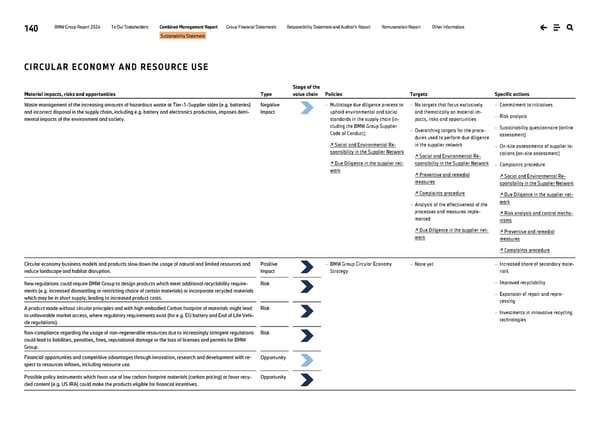140 BMW Group Report 2024 To Our Stakeholders Combined Management Report Group Financial Statements Responsibility Statement and Auditor’s Report Remuneration Report Other Information Sustainability Statement CIRCULAR ECONOMY AND RESOURCE USE Material impacts, risks and opportunities Type Stage of the value chain Policies Targets Specific actions Waste management of the increasing amounts of hazardous waste at Tier-1-Supplier sides (e.g. batteries) and incorrect disposal in the supply chain, including e.g. battery and electronics production, imposes detri- mental impacts of the environment and society. Negative Impact − Multistage due diligence process to uphold environmental and social standards in the supply chain (in- cluding the BMW Group Supplier Code of Conduct) ↗ Social and Environmental Re- sponsibility in the Supplier Network ↗ Due Diligence in the supplier net- work − No targets that focus exclusively and thematically on material im- pacts, risks and opportunities − Overarching targets for the proce- dures used to perform due diligence in the supplier network ↗ Social and Environmental Re- sponsibility in the Supplier Network ↗ Preventive and remedial measures ↗ Complaints procedure − Analysis of the effectiveness of the processes and measures imple- mented ↗ Due Diligence in the supplier net- work − Commitment to initiatives − Risk analysis − Sustainability questionnaire (online assessment) − On-site assessments of supplier lo- cations (on-site assessment) − Complaints procedure ↗ Social and Environmental Re- sponsibility in the Supplier Network ↗ Due Diligence in the supplier net- work ↗ Risk analysis and control mecha- nisms ↗ Preventive and remedial measures ↗ Complaints procedure Circular economy business models and products slow down the usage of natural and limited resources and reduce landscape and habitat disruption. Positive Impact − BMW Group Circular Economy Strategy − None yet − Increased share of secondary mate- rials − Improved recyclability − Expansion of repair and repro- cessing − Investments in innovative recycling technologies New regulations could require BMW Group to design products which meet additional recyclability require- ments (e.g. increased dismantling or restricting choice of certain materials) or incorporate recycled materials which may be in short supply, leading to increased product costs. Risk A product made without circular principles and with high embodied Carbon footprint of materials might lead to unfavorable market access, where regulatory requirements exist (for e.g. EU battery and End of Life Vehi- cle regulations). Risk Non-compliance regarding the usage of non-regenerable resources due to increasingly stringent regulations could lead to liabilities, penalties, fines, reputational damage or the loss of licenses and permits for BMW Group. Risk Financial opportunites and competitive advantages through innovation, research and development with re- spect to resources inflows, including resource use. Opportunity Possible policy instruments which favor use of low carbon footprint materials (carbon pricing) or favor recy- cled content (e.g. US IRA) could make the products eligible for financial incentives. Opportunity
 BMW Group Report 2024 Page 139 Page 141
BMW Group Report 2024 Page 139 Page 141